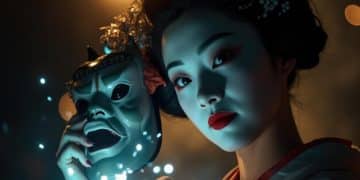The Allure and Controversy of in the Drama Reviews Sphere

addresses the core themes, controversies, and artistic merits that have shaped its reception and impact within the realm of drama reviews.
In the complex tapestry of dramatic arts, emerges as a subject of intense scrutiny and fervent debate. Many have questioned the purpose of , while others have praised it.
What is ?
is a concept that delves into the exploration of human emotions, conflicts, and experiences through storytelling. It spans across various forms of art, including literature, film, and theater, each offering a distinct lens through which to examine the complexities of life.
Origins and evolution of
The origins of can be traced back to ancient Greek tragedies and Shakespearean plays. Over time, it has evolved, reflecting societal changes and expanding to include diverse narratives and mediums, resulting in a rich and multifaceted genre.
Key elements that define
To define , key elements like intense emotional expression, moral dilemmas, and complex character development play pivotal roles. These components contribute to a narrative that captivates and challenges audiences, prompting reflection on the human condition.

- Emotional depth: Provides a profound emotional experience for the audience.
- Conflict: Involves internal and external struggles that drive the plot.
- Character development: Explores the evolution of characters facing challenging circumstances.
Ultimately, serves as a powerful medium for exploring the depths of human experience, challenging audiences to confront difficult questions and emotions while fostering a deeper understanding of themselves and the world around them.
The Role of Drama Reviews
Drama reviews serve as a critical bridge between artistic creations and the audience, guiding viewers through the complex terrain of dramatic storytelling. These reviews offer insightful analyses and critiques that enhance the audience’s understanding and appreciation of the work.
Why Drama Reviews Matter
Drama reviews provide valuable context, interpretation, and assessment of dramatic works, influencing public opinion. They shape critical discussions and contribute to the cultural significance of plays, films, and television series.
Components of a Good Drama Review
An effective drama review includes a balanced evaluation of plot, character development, acting performances, direction, and technical elements. It combines objective analysis with informed subjective insights, supported by evidence from the text or performance.
- Insightful analysis: Provides thoughtful interpretations of the work’s themes.
- Contextual understanding: Considers the historical, social, and cultural background.
- Balanced critique: Offers both praise and constructive criticism.
Good drama reviews can elevate public discourse about the arts, contributing to the intellectual and cultural enrichment of society.
The rise of in modern storytelling
has seen a resurgence in popularity in modern storytelling, driven by audiences seeking narratives that resonate deeply on an emotional and intellectual level. The genre’s capability to depict complex and relatable human experiences accounts for its widespread appeal.
Trends in contemporary
Contemporary includes explorations of social justice, mental health, and identity. Its ability to reflect and engage with current social issues further enhances its relevance and attractiveness.
Examples of impactful works
Modern masterpieces range from theater to film, with examples such as “Parasite” and “Succession.” These works, praised for their complex storytelling and emotional depth, have made a significant impact on audiences and critics alike.

Modern continues to evolve, pushing boundaries and exploring new and innovative ways to represent the human experience, making it a significant and influential genre in contemporary storytelling.
Controversies surrounding
Despite its cultural and artistic value, is not without controversy. Discussing sensitive topics to explore the human condition can often stir debate and challenge societal norms. Controversies often arise from depictions of morally ambiguous characters, graphic violence, or emotionally charged scenes.
Common criticisms of dramatic works
Common criticisms include claims of being gratuitous, exploitative, or overly sensationalized. Understanding these critiques is essential for a balanced assessment of the work.
Ethical considerations in portraying
Ethical considerations include respecting cultural sensitivities and portraying subjects with accuracy and respect. Responsible storytelling is essential to avoid perpetuating harmful stereotypes or causing unnecessary distress.
By addressing these ethical concerns, artists can create more inclusive and meaningful dramas that foster empathy and understanding.
Navigating different subgenres of
navigating its subgenres, the rich diversity becomes apparent ranging from legal and medical dramas to wartime and family sagas. Each subgenre offers its unique lens and thematic focus.
Overview of popular subgenres
Popular subgenres include legal dramas, showcasing courtroom battles, medical dramas navigating hospital emergencies, wartime dramas reflecting soldiers’ resilience, and family sagas exploring generational conflicts.
How to approach reviewing each subgenre
Approach each subgenre by understanding the specific conventions, themes, and expectations of that subgenre. By doing this, it ensures a fair and accurate assessment.
- Legal dramas: Should be evaluated based on realism and thematic relevance.
- Medical dramas: Examined for accuracy and cultural relevance.
- Wartime dramas: Should be reviewed based on emotional depth and cultural accuracy.
Understanding the unique aspects of each subgenre enhances the quality and depth of dramatic storytelling.
The Future of Drama Reviews
The future of drama reviews will be significantly shaped by digital media and evolving audience expectations. As platforms evolve, so too must the methods that critics use to analyze and assess dramatic works.
The impact of digital platforms
Digital platforms have expanded accessibility to drama reviews. These platforms allow critics to reach global audiences and fostering real-time engagement via social media and online forums.
The role of technology
Technology is beginning to provide new analytical tools for drama reviewers. These tools enable deeper insights and more data-driven assessments, enhancing the review process.
The future of drama reviews will be marked by greater audience interaction, more diverse voices, and more sophisticated analytical approaches, making it a dynamic and evolving space.
| Key Aspect | Brief Description |
|---|---|
| 🎭 Understanding | Explores complex emotions, morals, and struggles. |
| ✍️ Drama Review Role | Bridge audience to performances by offering interpretation and critique. |
| 🔄 Subgenres of Drama | Ranges from legal to war, offering rich diversity. |
| 📱 Future Impact | Digital platforms provide accessibility for drama, allowing a global reach for reviews. |
Frequently Asked Questions About
▼
primarily focuses on intense emotions, moral conflicts, and deep character studies. It explores internal themes of human existence, differentiating itself from genres focused on action or comedy.
▼
Drama reviews analyze and interpret complex themes, guiding viewers on what to anticipate from a performance. It is crucial to know that a review can make or break a series by creating buzz.
▼
Yes, filmmakers need to respect social and cultural sensitivities, portray subjects with respect, and avoid stereotypes that may perpetuate harmful messages. They should also protect subjects’ welfare at all times.
▼
Emotion is very important in , as it drives the narrative and allows writers to explore human experiences, build empathetic connections, and encourage introspective thoughts from the audience.
▼
In today’s digital age, some challenges include adapting to evolving media platforms, managing real-time engagement, addressing misinformation, and being aware of the rapid pace of digital content creation.
Conclusion
In conclusion, remains a vital genre in contemporary storytelling, continuing to evolve and adapt through digital media and shifting audience expectations. It serves as a powerful tool for understanding our shared human experiences.





